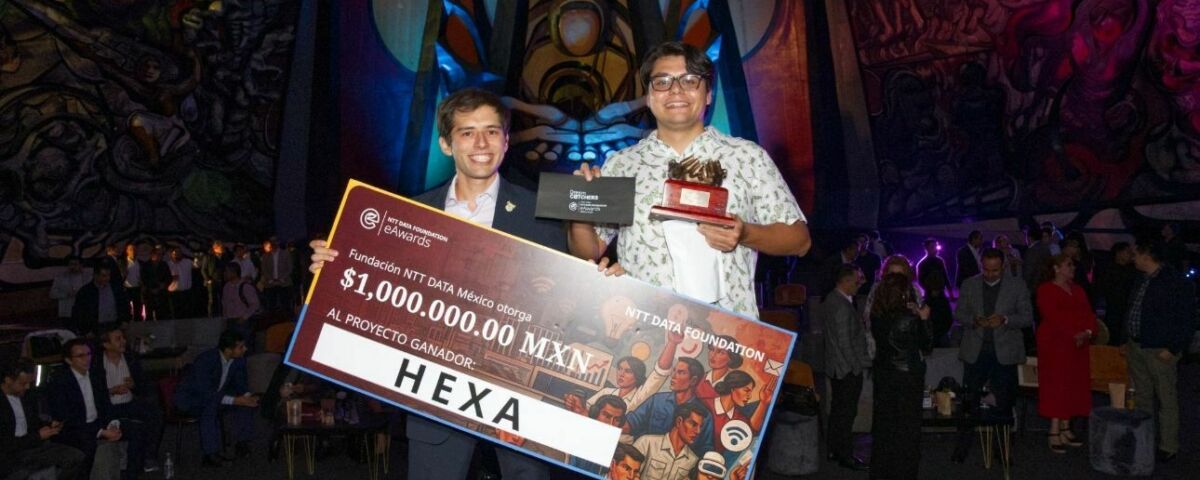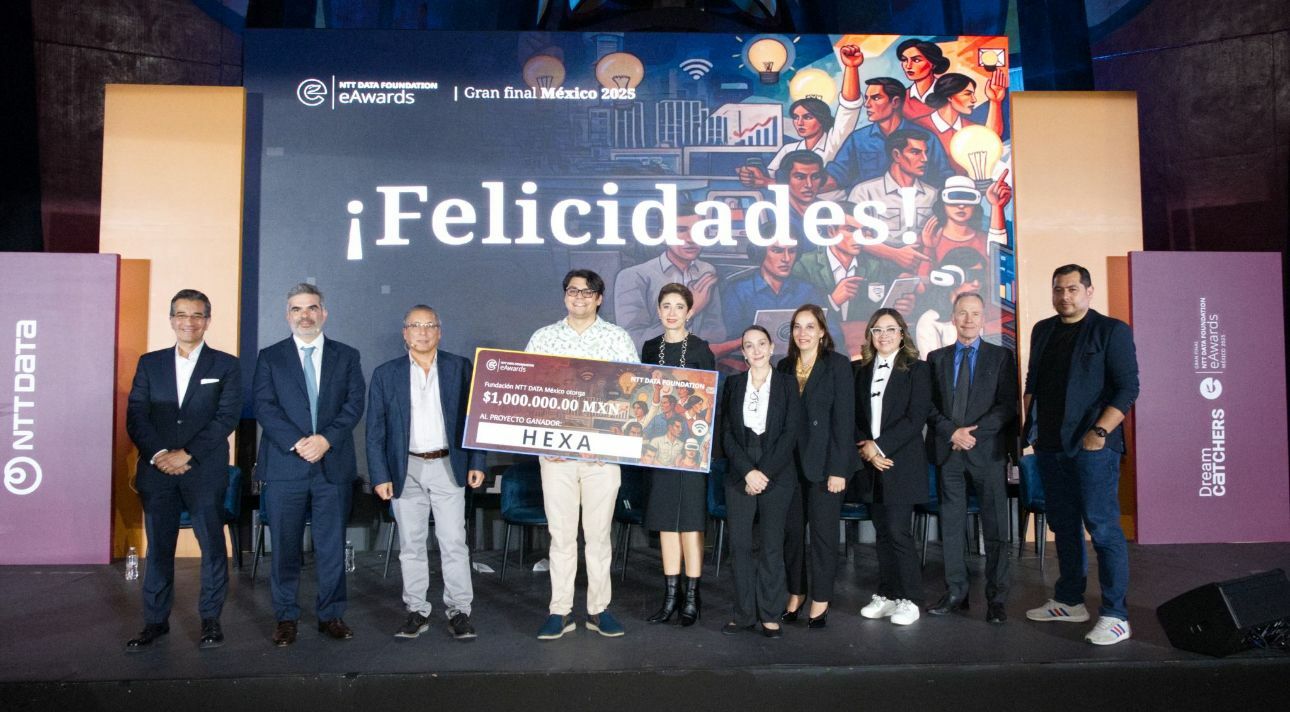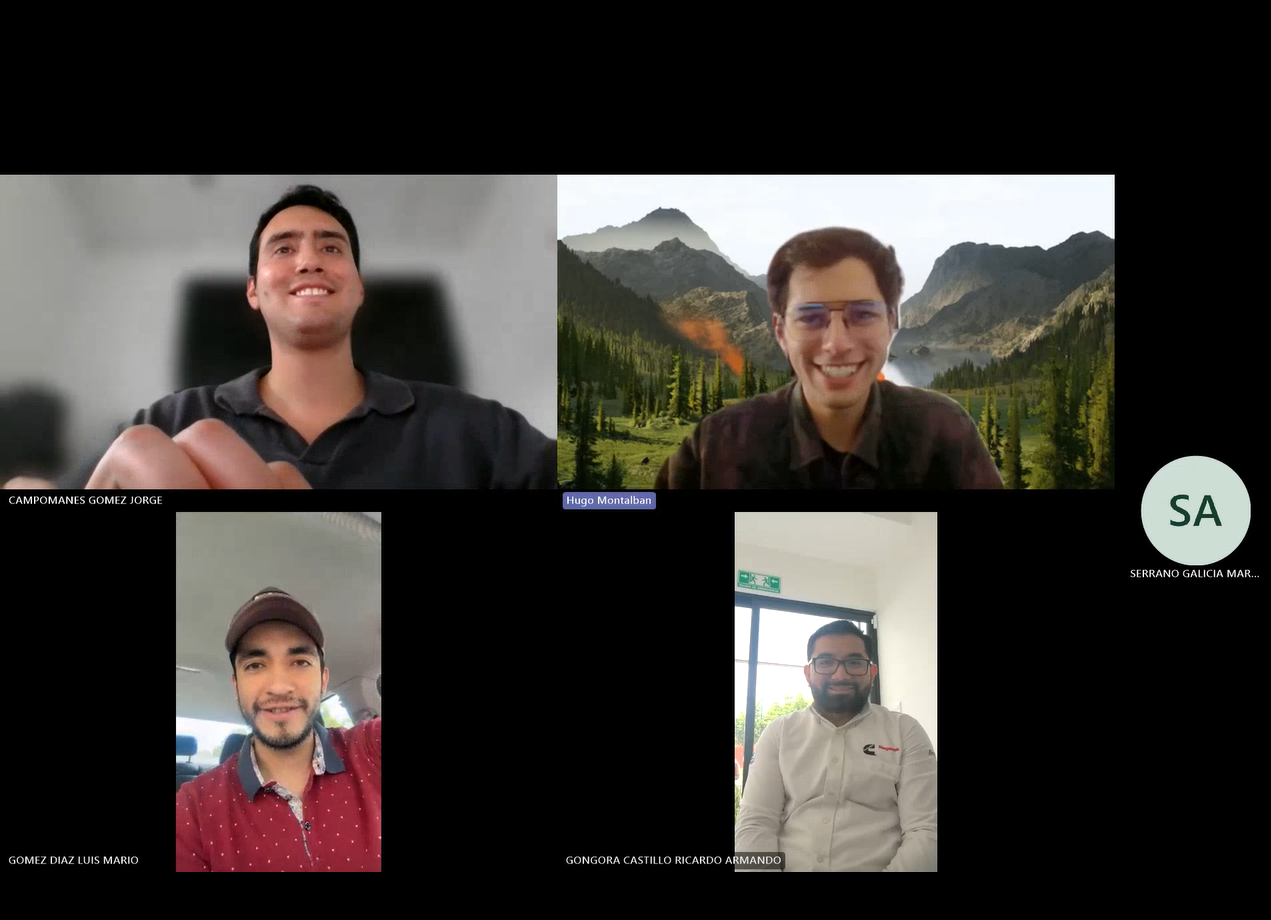





Keep this story going! Share below!
HEXA is a Mexican social enterprise focused on tackling plastic waste through an innovative bioprocess that transforms polystyrene (PS) and low-density polyethylene (LDPE) into valuable resources. By feeding these plastics to insects and converting their by-products into protein for poultry and aquaculture as well as fertilizer for agriculture, HEXA integrates waste management with food production. This innovation directly advances UN SDGs, particularly Responsible Consumption and Production (12), Climate Action (13), Industry, Innovation and Infrastructure (9), and Decent Work and Economic Growth (8).
HEXA’s innovation consists of a circular economy model where plastics that traditionally end up in landfills or oceans are redirected into a productive cycle. The company collects waste plastics from hotels in Playa del Carmen, one of the regions with the poorest solid waste management systems in Mexico. These plastics are treated and transformed into “plastimida,” a feed mixture given to specialized insects that break down the polymers. Through this process, two main products emerge: high-quality protein pellets for poultry and aquaculture, and carbonized microplastic-free fertilizer generated through pyrolysis of insect excreta.
This process is unique because it not only removes pollutants but also adds value to agricultural and livestock sectors, creating a closed loop: hotels provide the plastic waste, HEXA bioprocesses it, farmers benefit from the protein and fertilizer, and the hotels ultimately source better quality products from local farmers. Hugo Montalbán explained that their main KPI is tons of plastics bioprocessed, reflecting their commitment to measurable environmental impact.
HEXA represents one of the first industrial-scale projects worldwide applying insect bioconversion specifically to non-recyclable plastics, offering a replicable model that could be scaled nationally and globally.

Hugo Montalbán emphasized that his personal purpose has always been to “transform the world in favor of the common good, creating conditions for others to take action.” This mindset guided him through different roles, from conservation of axolotls to industrial process improvement, until joining forces with a biologist, Isaac de la Rosa, who had been researching insects for over five years. Isaac originally explored insects as human food, but his passion for entomology revealed their potential for plastic transformation.
Hugo recalled that aligning personal missions was crucial: “Before launching HEXA, we asked ourselves what each of us sought in life. Only when we confirmed that our purposes aligned did we build the purpose of the organization.” This clarity of vision turned HEXA into more than a business—it became a vehicle to embody values and mission.
Another strong source of inspiration for Hugo was the need to go beyond the laboratory and connect with communities. He described how meaningful it was to involve local populations in environmental solutions, seeing their active participation as proof that change must be collective. The victory at the NTT DATA eAwards 2025 was also a motivational milestone, showing that innovative, sustainability-driven projects can gain recognition and credibility at a national and international level.
The impact of HEXA can be seen in three main dimensions: business, society, and the environment. For businesses, particularly hotels in Quintana Roo, HEXA offers a solution that helps them comply with international certifications for waste management, ensuring their operations are more sustainable and appealing to eco-conscious tourists. For farmers, HEXA provides protein supplements that reduce production cycles in poultry and aquaculture, improving efficiency and product quality.
For society, the innovation addresses one of the most pressing challenges of our era: plastic pollution. By redirecting plastics away from open-air landfills and repurposing them into useful outputs, HEXA helps reduce contamination risks and generates new opportunities for rural communities. Hugo mentioned that when they presented their solution to farmers, 85% of them immediately expressed interest in adopting it, showing its tangible relevance.
In terms of environmental impact, HEXA’s processes eliminate microplastics through pyrolysis, preventing them from re-entering ecosystems. Short-term, this innovation helps manage waste in Playa del Carmen and supplies farmers with sustainable inputs. Long-term, HEXA aims to license its technology worldwide, multiplying the volume of plastics bioprocessed and potentially reducing millions of tons of waste. Evidence of its impact includes winning the eAwards 2025 among 502 projects and obtaining letters of intent from hotels requesting the service.
For HEXA, the innovation created not just a business model, but an entire market ecosystem. By converting plastic waste into protein and fertilizer, the enterprise positioned itself at the intersection of waste management, agriculture, and livestock industries. This opened new revenue streams: direct product sales to farmers, waste management services to hotels, and future licensing of the technology to global partners.
Hugo highlighted that a key advantage was client validation from both sides. Farmers see direct economic benefits by reducing production cycles and improving efficiency, while hotels gain reputational value and compliance with sustainability standards. These dual benefits have attracted investments, including land, capital, and strategic alliances from local partners.
In addition, winning the NTT DATA eAwards gave HEXA national visibility, credibility, and access to an acceleration program through StartUp México. These opportunities will facilitate growth, attract talent, and secure resources for scaling up operations. As Hugo pointed out, the ultimate indicator for the company’s sustainability is ensuring the sale of its products, because “without fuel, the organization cannot keep running.” HEXA’s model guarantees that impact and profit reinforce each other.
From a societal perspective, HEXA contributes to building awareness about responsible consumption and waste management. By involving local communities and creating shared value chains, it fosters collaboration between businesses, farmers, and consumers. This inclusive approach ensures that solutions are not imposed externally but developed in partnership with stakeholders.
Environmentally, HEXA directly tackles plastic waste, one of the most persistent pollutants threatening ecosystems and human health. By ensuring plastics are not only broken down but fully transformed into safe, productive outputs, the company prevents microplastics from contaminating soils and water. Hugo explained that through pyrolysis, even the excreta of insects—which could still contain microplastics—are carbonized into a clean fertilizer, guaranteeing ecological safety.
In the short term, this innovation reduces the burden of open-air landfills in Quintana Roo and provides local farmers with cost-effective, sustainable resources. In the long term, HEXA aims to expand its model internationally, potentially transforming global waste management and food production practices. As Hugo envisioned, HEXA could evolve into “HEXA Group,” branching into agro, pharmaceutical, and nutritional sectors while maintaining its mission of promoting the common good and responsible innovation.
Get stories of positive business innovations from around the world delivered right to your inbox.
Hugo Montalbán, Co-founder


HEXA is a Mexican circular-economy startup that bioprocesses hard-to-recycle plastics (PS, LDPE) with insects to produce protein for poultry and aquaculture, and microplastic-free fertilizer via pyrolysis. Based in Playa del Carmen, it sources plastic from hotels and supplies farmers, closing a local loop between waste, food production, and soil health. Its core KPI is tons of plastic bioprocessed, with product sales sustaining the model and technology licensing planned for scale.